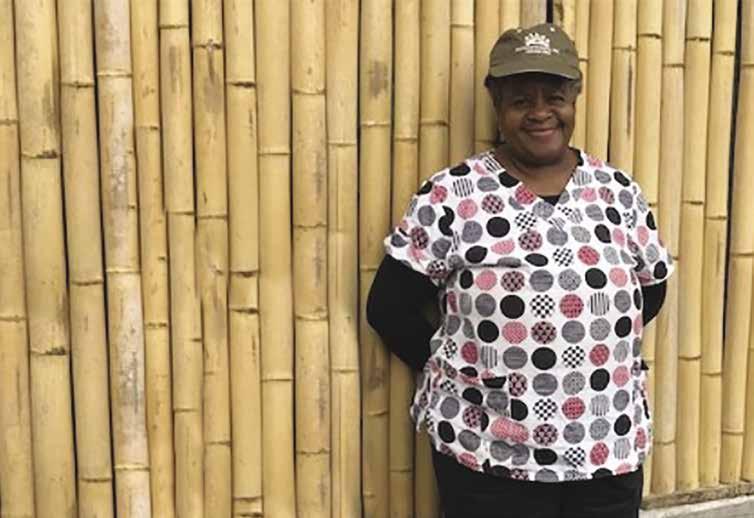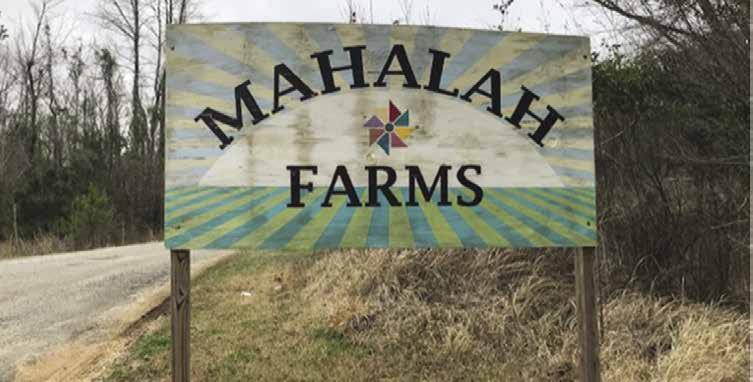
4 minute read
Business of Farming
Mahalah Farms
Advertisement
The Alabama Cooperative Extension System (ACES), the primary outreach organization for the land-grant mission of Alabama A&M University and Auburn University, delivers research-based educational programs that enable people to improve their quality of life and economic well-being. Because of the ACES mission, Yawah Awolowo’s success story is an inspirational highlight for farmers of today and tomorrow.
If you ever find yourself traveling through Cuba, Alabama, you may notice signs that lead you to Mahalah Farms. Anyone who has had the privilege to have conversations with farm owners know that they can share many stories of survival, resiliency and triumph. One of those farmers is Yawah Awolowo.
“Let your food be your medicine and let your medicine be your food.” This is the belief of Yawah Awolowo, a native of Cuba, Alabama, who has been a vegan/vegetarian chef for over 30 years. Today, she is the owner of Mahala Farm, named after her late aunt who raised her until she was 12. In 1965, Yawah moved to Knoxville, Tennessee, but every summer she would return to her beloved family farm.
Eventually Yawah started a catering service, Harambee, with a European friend. Harambee is Swahili meaning working and pulling together. Her vegan/ vegetarian catering service led to backstage catering events for several celebrities including India Arie, Bonnie Raitt, BB King, Kenny G and The Neville Brothers. In 2003, her catering service gained her the opportunity to travel to Brazil to participate in a World Social Forum expo/workshop. At this workshop, she learned about the benefits of growing foods organically.
After traveling abroad, she was inspired to begin farming. She believed that the Mahalah Farm would be the best place to start. Therefore, she decided to grow and produce her own crops, remembering as a child that her aunt would grow cotton, corn and peanuts on this same soil. Yawah’s first attempt at farming took place one spring before leaving to work with the Children Defense Fund as a vegan consultant and chef. Before leaving, she planted different seeds on several acres of the farm. When Yawah returned, she
was amazed to see that the seeds had grown without any maintenance. This sparked her interest even more in farming.
Yawah’s desire for farming led her to search for opportunities to assist with farming. Research and assistance from local Extension agents allowed her to gain knowledge about available resources and programs. In addition, she began attending various farm-related conferences that were held at Alabama A&M, Auburn University and Tuskegee University. At these conferences, participants received vital information relevant for minority women in agriculture.
Some of Yawah’s accomplishments were applying and receiving funding from Natural Resources Conservation Service to construct a hoop house and drip irrigation system. With the development of this project, she was able to produce an abundance of cabbages. When, to her surprise, 999 of the 1,000 cabbages she planted made a crop that year, she had to get creative with value-added ways to market her crop. A value-added product is the production of a particular product in a way that enhances its value. This led to her creation of Country Caviar, a customer favorite that is a savory blend of organic vegetables.
Yawah has spent the last few years working with Auburn University staff to develop innovative ways to continue moving her farm forward. She has also collaborated with many influential organizations such as Black Belt Citizens Fighting for Health and Injustice, Children Defense Fund, and she is a member of the Alabama Medicinal Herb Association. She also serves as community outreach coordinator with Alabama A&M University.
Currently, Yawah is actively managing Mahalah Farm to produce a wide variety of crops such as fruit trees, rice, corn, potatoes, carrots, herbs, watermelons, collard greens, turnip greens, cabbages, snap beans, squash, gourds, peanuts, bamboo and hemp. She continually searches for ways to make her farm more organic.
Despite being affected by COVID-19, she can testify to the goodness that has come out of this pandemic. She was able to open her home and farm as an educational tool for youth and adults ranging from 3-40 years old. For those who had never experienced farming, Yawah used her knowledge to teach them some farming basics. This was a joyous and rewarding occasion for Yawah as she expands her vision for Mahalah Farm to become a teaching farm embodying her motto of “using what you have to make what you need.” Therefore, if you ever find yourself in Cuba, Alabama, visit Mahalah Farm.
ACES offices are located in all 67 Alabama counties, supported by Regional Extension Agents across the state, and Specialists at both partner universities. If you are interested in becoming a farmer, you can visit your local Extension office or www.aces. edu for more information.











